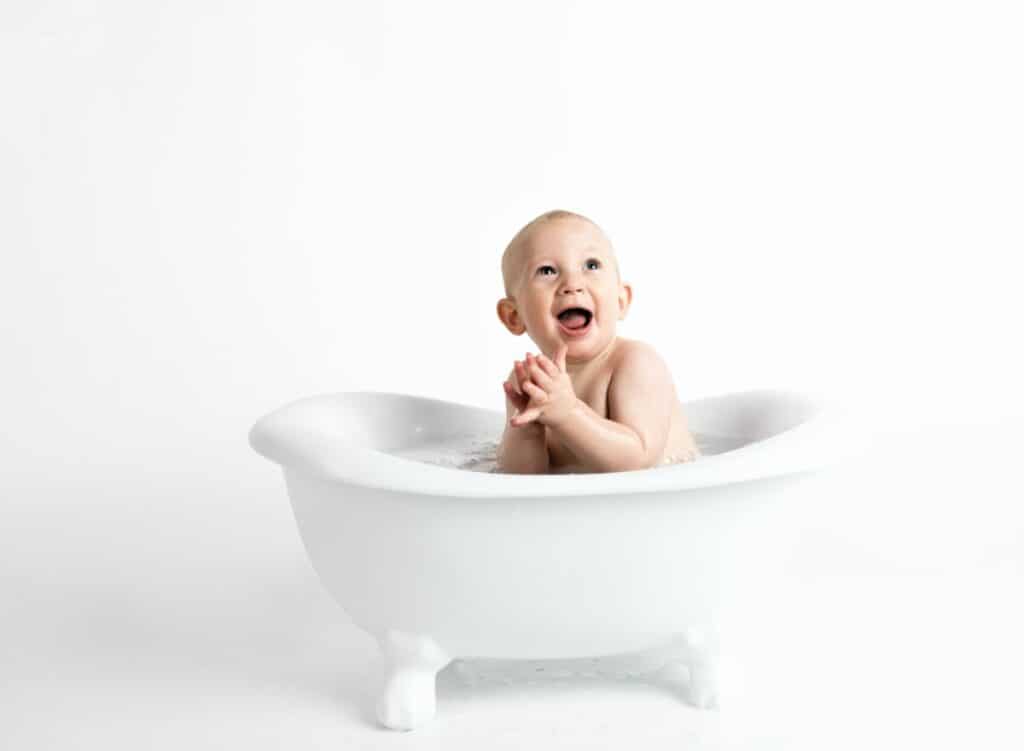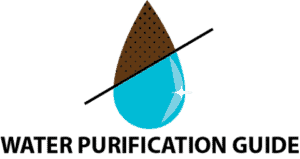Well water contaminants can be hazardous for babies to bathe in. Bathing your baby in well water that is hard water can also lead to skin problems such as skin itching and rough/dry skin.
If you use well water or are visiting a home or holiday home that has well water, you’re probably concerned about using this kind of water to bathe your baby.
In this article, we explain in detail why well water is not safe for babies to bathe in. We’ll also discuss some other options for your baby’s bath water, how you can soften well water to make it better for your baby, and TONS more. Let’s dive in!

Well Water Contaminants And Babies
About 43 million families across the United States get their water from private wells. If you’re one of them, you’re probably skeptical about using the same water to bathe your child.
Untreated well water is simply groundwater. Most groundwater contains contaminants such as heavy metals, POPs (persistence organic pollutants), and minerals that may have adverse effects on your child’s skin and health.
Since your baby’s skin is young and delicate, bathing your baby in well water can cause mild to severe skin disorders, including itching, eczema, rough and dry skin, and can be a source for infections.
Private wells often contain many undesirable chemical compounds, harmful elements, and other contaminants (both by human activities and naturally occurring sources).
Below I’ll discuss some of the more important contaminants found in well water, their sources, and their potential impacts on babies.
Nitrates and Nitrites
Studies show that well water contains concentrations of nitrates that significantly exceed the federal drinking water standards.
Nitrates often contaminate well water through surface water seepage, groundwater movement, and water run-off. They’re typically present in human sewage, chemical fertilizers, and animal waste/fertilizer.
These nitrates, however, don’t pose any toxic risk to well water users on their own. When nitrates get into the body, they convert to nitrites, which are potentially harmful.
For babies, nitrates and their conversion to nitrites can lead to a health condition known as methemoglobinemia.
Methemoglobinemia, also called blue baby syndrome, is a dangerous and potentially fatal blood disorder interfering with blood oxygen levels.
Infants who get exposed to a high level of nitrates can become seriously ill and it can even be fatal. Although a few accidental sips of water from a bath containing nitrates won’t do any major damage, it’s just something you should be aware of if you use well water often.
Well owners should get their water tested for Nitrates every year.
Organic Chemicals
Organic chemicals are found in various household products that are also used in agriculture and industry. Organic chemicals can be found in products such as inks, pesticides, dyes, paints, petroleum products, solvents, pharmaceuticals, disinfectants, and sealants.
Organic chemicals seep into groundwater and generally contaminate private wells through surface water run-off, waste disposal, and spills.
Adults and children who consume high levels of organic chemicals may suffer from damage to their liver, kidney, nervous system, and circulatory system. And since the infants’ skins are delicate, contact with the organic compounds can cause severe skin disorders.
Microorganisms
Microorganisms include viruses, bacteria, and parasites. They’re found in human sewage and animal waste.
Microorganisms contaminate well water through water run-off from snowfall or rainfall that wash these microorganisms into the groundwater. Effluent from septic leach fields and leakages from underground waste storage tanks can reach the groundwater resulting in harmful microorganisms being present in well water.
Bathing your baby with well water that contains microorganisms can quickly result in gastrointestinal infections and skin-related disorders.
Blue-green Algae
Blue-green algae, also called cyanobacteria, is a type of bacteria with both algae and bacteria’s traits. Blue-green algae can quickly grow in wells forming visible blooms. These blooms resemble spilled bluish-green paint or pea soup.
Fresh algae blooms usually smell like recently mown grass and older algae blooms have a strong rotting garbage smell – so keep a nose out when running a bath for your baby.
Scum lines in the bath that have a greenish color may also indicate algae was or is in the water.
Well water affected by blue-green algae is NOT safe for baby bathing, adult recreation, or drinking.
Some species of this algae produce harmful toxins.
Bathing your baby with algae affected water can cause severe skin irritations, hay-fever like symptoms, and mild respiratory effects. Ingesting these toxic compounds can also cause diarrhea, vomiting, headaches, and fever.
Water Purification Guide has more information on how to get rid of algae from your well in this detailed post.
Which Water Is Good For A Baby Bath?
Most babies love the feeling of being in water. Using purified and soft, warm water to give your baby a bath is best for both you and your child.
Pure and soft warm water relaxes and soothes your child without causing any adverse effects as opposed to well water that is untreated or poorly treated.
If your baby is suffering from cradle cap, eczema, psoriasis, or dermatitis, it’s essential to do all you can to avoid making the condition worse. Using warm purified water is one of the best and easiest ways to positively help your baby’s skin.
Here are more benefits of using pure warm water to bathe your baby:
- You can bathe your baby as often as you like without irritating his/her skin.
- You’ll be able to prevent and manage any skin conditions effectively.
- You don’t have to worry if your baby swallows a little bit of the water – which is of course, highly likely.
But, if soft water isn’t an option for you then standard tap water, which has been treated and filtered, is fine. You can also look into installing a faucet or shower filter in your bathroom to improve the quality of the water your baby washes in.
How to Soften your Baby’s Bath Water
Soft water is always the best for your child’s long-term overall health. As mentioned before, hard-water minerals from private wells or in regular tap water can lead to skin related issues for you and your baby.
If you do have hard to very hard water, there really are only three ways to soften it:
1. Install An Ion Exchange Water Softener
Water softeners quickly and effectively turn hard water into soft water, which will be safe for your baby to bathe in.
Ion exchange water softeners release potassium and sodium ions, through the addition of salts, which replace the magnesium and calcium minerals that cause water hardness.
2. Use A Salt-Free Water Softener
Salt-free water softeners – also called water conditioners – work by crystalizing the scale-forming minerals inside the tank on a special membrane.
These systems waste less water than ion exchange water softeners, do not require electricity or salt, and are an easy install if you want to do it yourself.
3. Install A Whole House Filter System
Whole house water filters remove hard water minerals through chemical and mechanical filtration.
Note: Faucet filters will not sufficiently soften water for your baby’s bathwater.
Frequently Asked Questions
Can You Use Bath Salts For Babies?
Bath salts contain magnesium sulfate, which makes the bathwater HARD.
Bathing your baby in water with dissolved bath salts is ok, but no more than 2-3 times per week. Make sure the salts are completely dissolved before putting your baby in the bath.
Is It Bad for Babies to Drink Bath Water?
Bathwater is like a cocktail of shampoo, sweat, dead skin cells, hair, bacteria, and germs, often with some urine thrown in. While this may sound very unpleasant, one or two sips won’t make your baby sick. The amount of water in the tub is enough to dilute most things that might be potentially dangerous.
However, there are instances when drinking bathwater may not be such a great idea, especially when baby poop is involved. If your baby poos in the bath and then accidently drinks a little, it could cause a mild upset tummy.
After cleaning your baby’s bathtub, there will be some chemical residue left behind. If the tub is rinsed and wiped down thoroughly, there will be minimal amounts of any chemicals remaining in your baby’s bathwater, so don’t worry too much if they end up drinking some of the water.
Final Thoughts
Untreated well water contains contaminants and hard-water minerals that can make it unsafe for babies to bath in. The dangers include skin-related problems and other more severe health related issues.
Warm purified and soft water is the safest bathwater for your baby. If you don’t have a soft water supply in your home, consider using a water softener before bathing your baby.
